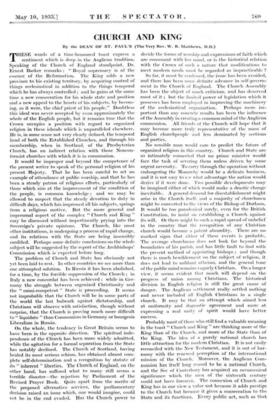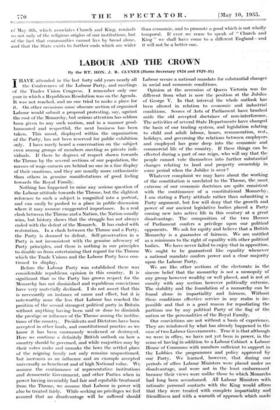CHURCH AND KING
By the DEAN OF ST. PAUL'S (The Very Rev. W. R. Matthews, D.D.)
THESE words of a time-honoured 'toast express a sentiment which is deep in the Anglican tradition. Speaking of the Church of England standpoint, Dr. Ernest Barker remarks : "Royal supremacy is of the essence. of . the Reformation. The King adds a new province to his existing territory, by acquiring control of things ecclesiastical in addition to the things temporal Which he has always controlled ; and he gains at the same time a new consecration for his whole state and position and a new appeal to the hearts of his subjects, by becom- ing, as it were, the chief priest of his people." Doubtless this ideal was never accepted by even approximately the whole of the English people, but it remains true that the Crown oecupies a position with regard to organized religion in these islands which is unparalleled elsewhere. He is, in some sense not very clearly defined, the temporal head Of 'both the Established Churches, and through his membership, when in -Scotland, of the Presbyterian Church, has an indirect • relation 'with those Noncon- formist .churches with which it is in communion.
It would be improper and beyond the' competence of the present writer to speak of the personal religion of his present Majesty. That he has been Careful to set an example 6f attendance at public worship, and that he has been a steady patron of religious efforts, particularly of those which aim at the improvement of the condition of the .people, is common knowledge ; and we may be allowed to suspect that the steady • devotion to duty in difficult daYs, which his impressed all his subjects, springs from a religious motive. But the more general and impersonal aspect of the complex "Church and King" May be discussed without impertinently prying into the Sovereign's' private opinions. The Church, like most other institutions, is undergoing a process of rapid change, and its relations with the State are being insensibly modified.' Perhaps some definite conclusions on the whole subject will be suggestedby the report of the Archbishops' Commission. which is 'expected before long..
The problem of Church and State has obviously not yet been laid' to rest. In other countries we see more than One attemptedsolution. In Russia it has been abolished, for a time, by the forcible suppression of the Church ; in Italy a new concordat has been achieved ; while in Ger- many the struggle between organized Christianity and the " omni-competent " State is proceeding. It seems not improbable that the Church will be in some parts of the world the list bulwark against 'dictatorship, and Christians will observe with satisfaction, though without Surprise, that the Church is proving much more difficult to" liquidate "than Communism in Germany or bourgeois Liberalism in Russia. . On the Whole, the tendency in Great Britain seems to have been in the opposite direction. The spiritual inde- pendence- of the Church has been more widely admitted, while the agitation for a formal separation from the State has notably declined. The Church of Scotland, having healed its most serious schism, has obtained almost com- plete self-determination and a recognition by statute' of its "inherent" liberties. The Church of England, on the other hand, has Suffered what to many still seems a terrible disaster—the rejection by Parliament of the Revised Prayer Book. Quite apart from the merits of the proposed alternative services, the parliamentary decision raised an issue which, one would imagine, could not be in the end evaded. Has the Church power - to decide the forms of worship and expressions of faith which are consonant with her mind, or is the historical relation with the Crown of such a nature that modifications to meet modern needs must be regarded as impracticable ?
So far, it must be confessed, the issue has been avoided, and there has been some definite advance in self-govern- ment in the Church of England. The Church Assembly has been the object of much criticism, and has deserved most of it ; but the limited power of legislation which it possesses has been employed in improving the machinery of the ecclesiastical organization. Perhaps more im- portant than any concrete results has been the influence of the Assembly in creating a common mind of the Anglican communion. All friends of the Church will hope that it may become more truly representative of the mass of English churchpeople and less dominated by sections and parties.
No sensible man would care to predict the future of organized religion in this country. Church and State are so intimately connected that no prime minister would face the task of severing them unless driven by some urgent necessity. To carry through the operation without endangering the Monarchy would be a delicate business, and it is not eaq. to s N.! what advantage the nation would derive if it were done. Two possible developments may be imagined either of which would make a drastic change inevitable. A general demand for disestablishment might arise in the Church itself, and a majority of churchmen Might be converted to the views of the Bishop of Durham. It would be too paradoxical surely, even for the British Constitution, to insist on establishing -a Church against its will. Or there might he such a rapid spread of unbelief in the country that the recognition of any Christian church would become a patent absurdity. There are • no Marked signs that either of these events is probable. The average churchman does not look far beyond the boundaries of his parish, and has little fault to find with the present method of appointing bishops ; and though there is much bewilderment on the subject of religion, it does not lead to militant atheism, and the general tone of the public mind remains vaguely Christian. On a longer view, it seems evident that much will depend on the progress of union among Christians. The historical division in English religion is still the great cause of danger. The Anglican settlement really settled nothing and never included all English Christians in a single church. It may be that an attempt which aimed less at uniformity and dogmatic agreement and more at expressing a real unity of spirit would have better success.
Probably most of those who still find a valuable meaning in the toast " Church and King" are thinking more of the King than of the Church, and more of the State than of the King. The idea of a purely national church has little attraction for the modern Christian. It is not easily reconciled with the New Testament, and it is out of har- mony with the renewed perception of the international mission of the Church. Moreover, the Anglican Com- munion has itself long ceased to be a national Church, and the See of Canterbury has acquired an oecumenical significance which the men of the sixteenth century could not have foreseen. The connexion of Church and King has in our view a value not because it adds prestige to the Church but because it gives a consecration to the State and its functions. Every public act, such as that of May 6th, which associates Church and King, reminds us not only of the religious origins Of our institutions, but of the fact that communities cannot live by bread alone, and that the State exists to further ends which are wider than economic, and to promote a good which is not wholly temporal. . If ever , we cease to speak of "Church and King" we shall have come to a different England—and it will not be a better one.



































































 Previous page
Previous page